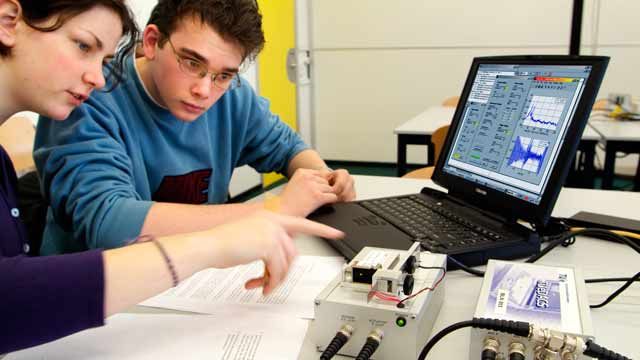Technische Universiteit Eindhoven Integrates Experimentation into the Engineering Curriculum
"Experimentation enables students to absorb what they have studied and learn how to solve engineering problems. With a notebook computer and MathWorks tools, our students can prepare and analyze real-time experiments anywhere and at any time, enabling our faculty to integrate hands-on experiences into almost every course and lab."
Challenge
Solution
Results
- Understanding of control theory reinforced through practical application
- Experimentation instilled as an engineering approach
- Advanced curriculum implemented

Technische Universiteit Eindhoven (TU/e) in The Netherlands is a leading international university specializing in engineering science and technology. Recognizing the central role played by experimentation in both research and industry, TU/e bases its engineering curriculum on hands-on lab work. Starting in their freshman year, students use experimentation to analyze and design increasingly sophisticated systems.
TU/e enables this approach by providing each student with a high-end notebook computer and campus-wide access to MathWorks products.
"We use MATLAB and Simulink as an infrastructure for conducting real-time experiments with actual hardware so that students can see how engineering theory works in practice," says Dr. René van de Molengraft, associate professor in the Department of Mechanical Engineering. "With campus-wide access to MathWorks tools, students can plan for—and analyze data from—experiments whenever and wherever they want."
Challenge
Approximately 150 first-year and 100 second- and third-year students, in addition to graduate students, take courses in control systems technology from the Department of Mechanical Engineering. This large group of students must share a limited number of lab hardware setups, which range from simple flexible-shaft systems to advanced mechatronic systems.
Portability was a crucial requirement for the new engineering infrastructure. Students would need not only to conduct real-time experiments and test their designs in the lab, but also to prepare for lab assignments at home or from anywhere on campus.
Solution
TU/e provides notebook computers preloaded with MathWorks software to all students, enabling them to work anywhere. Throughout their studies, students use MathWorks tools to solve increasingly complex technical challenges.
First-year mechanical engineering students use MATLAB®, Symbolic Math Toolbox™, and Simulink® to solve problems in linear algebra, ordinary differential equations, and programming.
Freshman mechanical engineers also complete a course on signal analysis in which they perform experiments to characterize simple flexible-shaft and leaf-spring systems as well as passive electronic filters. Using their notebook computers and a MATLAB based application developed at TU/e, they control these devices and take measurements via a real-time input/output device.
In their second year, students use Simulink to design and simulate a closed-loop feedback control system for an inkjet printer. The controller positions the print head by driving a DC motor and measuring its position using a linear encoder strip.
Students use Simulink Coder™ to generate control code, which they run using their notebook computers as real-time targets. Simulink external mode lets them tune control parameters and plot control variables while the printer is operating.
Third-year and graduate students compete in the department’s Pizzabot contest, in which they move pizzas from one rack to another as quickly as possible using a four-axis robotic arm. Students obtain time and frequency response data for each axis in MATLAB and then use Simulink to design feedback and feedforward controllers.
At the graduate level, TU/e students solve more advanced problems using MathWorks tools—for example, they develop control systems for fast motion systems such as wafer steppers. TU/e graduate students have also used MathWorks tools to compete successfully in intraschool competitions, such as RoboCup and Formula Student racing.
The experimentation infrastructure and approach are now used for both education and research projects in control systems theory and mechatronics.
Students throughout TU/e use MathWorks tools for statistical analysis, data processing, and signal processing and control, and the university continues to integrate MathWorks tools into the biomedical, mechanical, and electrical engineering curricula.
Results
Understanding of control theory reinforced through practical application. “Hands-on experience with MATLAB and real devices enables students to gain true insight into the dynamic phenomena of a system. I can lecture on poles and zeroes all day, but once students see it happen in a real system, they understand it and they never forget it,” says Dr. van de Molengraft.
Experimentation instilled as an engineering approach. “Our students learn that experimentation is crucial to the problem-solving process,” says Dr. van de Molengraft. “When they need to set up experiments for their final projects, in their graduate research, or for their jobs, they are used to that approach and have the skills to use it effectively.”
Advanced curriculum implemented. “MathWorks tools enabled us to develop gradually more complex coursework and to integrate elements of multiple engineering disciplines into the curriculum at the undergraduate and graduate level,” notes Dr. van de Molengraft. “Easy access to MathWorks tools anywhere on campus was a necessary condition for our approach.”